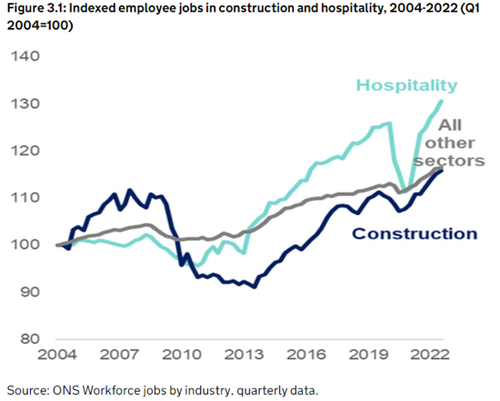A report released by the UK government and carried out by The Migration Advisory Committee (MAC) on the Shortage Occupation List (SOL) makes recommendations to support the recruitment and retention of migrant workers in the construction industry.
The interim report published on 15th March 2023, recommends more foreign construction workers should be granted entry into the UK to address labour shortages in the industry. The move is intended to help meet the demand for workers, which has been affected by the COVID-19 pandemic and the end of the Brexit transition period. Both the decision to leave the European Union (EU) with the consequent ending of Freedom of Movement, and the pandemic, have had significant effects on the employment of non-UK workers in these sectors.
The construction and hospitality sectors account for 6% and 7% of all workforce jobs respectively.

Figure 3.1 compares the change in employee jobs in construction and hospitality to all other sectors.
The MAC recommends that construction sector occupations be added to the SOL, including bricklayers, masons, roofers, roof tilers, slaters, carpenters, joiners, construction, building trades, and plasterers.
The report explores the shortage of workers in the UK construction industries, with a particular focus on migrant construction workers.
The interim report suggests that the government should take steps to improve working conditions and training opportunities in these industries, to attract more UK workers. It also recommends measures to support the recruitment and retention of migrant workers, such as improving the visa system and ensuring that workers are not exploited by employers.
A government spokesperson said:
“We work closely with the MAC to ensure our points-based system delivers for the UK and works in the best interests of the economy, by prioritising the skills and talent we need and encouraging long-term investment in the domestic workforce.”
Following sight of the report, UK Asbestos Training Association (UKATA) Chief Operating Officer, Craig Evans says:
“Migrant workers can play an important role in filling labour shortages in certain industries or sectors. They must be provided with the same instruction and training as British workers. Migrant workers have the same employment rights and entitlements as British workers. All workers are protected under British health and safety law, whether they are working in Great Britain legally or not. Every worker has the right to a safe workplace where any risks to their health and safety are properly controlled.
Legislation varies worldwide in respect of asbestos training. The Health and Safety Executive (HSE) stipulate that every employer must ensure that anyone who is liable to disturb asbestos during their normal work, or who supervises those employees, gets the correct level of information, instruction, and training so that they can work safely and competently without risk to themselves or others.
Language barriers and lack of awareness of the risks associated to working with asbestos, along with limited knowledge around UK guidance could potentially leave workers and members of the public exposed to deadly asbestos, if migrant workers are not provided with essential training.”
The HSE have resources available to support migrant workers and their employees . Employers have a duty to provide comprehensible information to workers. This does not have to be in writing or even necessarily in English, if work instructions, risks, safety measures and emergency procedures are clearly communicated to all workers.
Health and safety law does not require workers to be able to speak English but learning the language should help to reduce communication difficulties and can save on costs for translation. Employers can do this for non-English speakers through flexible working arrangements that allow them time to learn ‘workplace English’.
UKATA (the United Kingdom Asbestos Training Association) is a leading association dedicated to improving the quality and standards of asbestos training, with the goal of protecting workers and the public from the risks associated with asbestos exposure.
We are committed to promoting excellence in asbestos training through the development and implementation of high-quality training standards, the provision of best practice guidance, and the promotion of safe and responsible working practices within the asbestos industry.
As an association, we work closely with our members to ensure that they have access to the latest information, training resources and industry updates, and we provide a range of support services to help them achieve their training goals.
Our membership base includes a wide range of organisations involved in asbestos training, including training providers, asbestos removal contractors, consultants, and equipment suppliers.
At UKATA, we are passionate about promoting safe and responsible working practices, and we are committed to working together with our members and partners to achieve our shared goal of protecting workers and the public from the risks associated with asbestos exposure.
Published on Wednesday 5th April 2023

